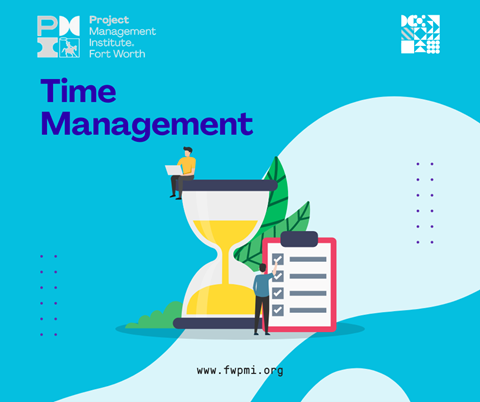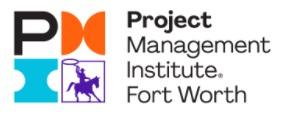Ten Tips to Master Time Management
by Tristan Martinez, PMP
Time management is a critical skill for project managers to possess. Let's face it, we have a lot on our plates. From managing our team to overseeing projects to staying up-to-date with industry trends, we need to learn to master the only real currency - time. So, we’ve put together a list of ten tips to help you be the time management ninja you were always meant to be.

Studies have shown that individuals who are skilled in time management are more productive, have better work-life balance, and experience less stress than those who struggle with the skill. In this article, we will discuss how project managers can implement time management into their personal and professional lives to improve productivity, reduce stress, and achieve their goals.
1. Understand Your Priorities
The first step in effective time management is understanding your priorities. As a project manager, you likely have a lot on your plate - from managing your team to overseeing projects to staying up-to-date with industry trends, you need to identify the tasks that are most important and prioritize them accordingly.
One effective tool for prioritization is the Eisenhower Matrix. It sounds fancy, but it categorizes tasks based on their urgency and importance. The matrix has four quadrants: urgent and important, not urgent but important, urgent but not important, and not urgent and not important. By using the matrix, you can easily identify which tasks require immediate attention and which can be deferred or delegated.
2. Set SMART Goals
Yes, we know everyone talks about SMART Goals, but the science backs it up. When we set goals that stretch our capabilities, we reach a higher level of mastery, autonomy, and purpose. Setting goals which are Specific, Measurable, Achievable, Relevant, and Time-Bound (SMART) enables project managers to focus their time and energy on tasks that will help them achieve their objectives.
SMART-goal development is a variation of Implementation Intentions (aka a fancy way of saying, “make a plan,”) which generates internal motivation by making a commitment to ourselves. The investment of time into the development of those goals in the SMART parameters enables our focus to the actions which would be best suited for staying on track with the goals.
3. Use Time-Tracking Tools
Time-tracking tools are essential for project managers who want to be effective stewards of their time. These tools help you monitor how you’re spending your time, identify areas where you’re spending too much time, and make adjustments to your time schedule as needed. The time-tracking tools range from simple timers to complex software programs.
There are a variety of time-tracking tools available, from simple timers to complex software programs. Some popular time-tracking tools include Toggl, RescueTime, and Clockify.
4. Avoid Multitasking
Contrary to popular belief, multitasking does not improve productivity. Even as I write this article, I have laundry in the dryer, a toddler asking to open fruit snacks, and the revitalized Blue’s Clues playing in the background. Most conducive environment for writing an article? Probably not.
Studies have shown that multitasking can actually reduce productivity and increase stress levels. Instead of multitasking, work through your priority list according to the Eisenhower Matrix, focusing on completing one task at a time. Ensure to include dedicated time for those smaller family members and furry friends, being cognizant of their needs for connection with you, too.
5. Take Breaks
Taking breaks is essential for maintaining productivity and reducing stress. Studies have shown that taking short breaks throughout the day can help us maintain our focus and productivity. We love the Pomodoro Technique. It involves working for a set period (usually 25 minutes) and then taking a short break (usually five minutes). After four Pomodoro sessions, take a longer break (usually 15 - 20 minutes).
6. Learn to Say “No”
We know you want to be a superhero, but even superheroes have limitations. Learning to say “no” is an essential part of effective time management. When deciding whether to say “yes” or “no” to a current project request, consider your current workload, the importance of the request, and whether the request aligns with your goals and priorities.
7. Develop a Routine
Developing a routine can help project managers to manage their time more effectively. By establishing a routine, project managers can eliminate decision fatigue and improve their productivity. A routine can also help project managers to make time for the tasks that are most important to them, such as exercise or spending time with family.
While stationed in San Diego, my husband and I developed essential daily, weekly, and monthly routines as a dual-active duty family. Ranging from waking up before the children to ensure a prioritized to-do list and alignment of activities (and the cup of coffee to wake up the sleepy brains) to a monthly meeting for budget and communication touch-bases. These routines provided us with a stable base from which we could launch the rest of our activities and remain successful.
8. Get Organized
Getting organized is essential for effective time management. Project managers should make an effort to keep their workspace and schedule organized, so they can quickly find out what they need and avoid wasting time searching for information.
One effective tool for staying organized is a task management system. Nowadays, there are many variations and flavors of task management tools to choose from to help keep track of to-do lists, deadlines, and priorities. Some popular systems include Asana, Trello, Todoist, and my current favorite, Notion.
9. Delegate Tasks
Delegating tasks is an essential part of effective time management. Project managers should delegate tasks to team members who are best equipped to handle them, freeing up their own time to focus on tasks that require their specific expertise.
When delegating tasks, project managers should consider the following factors: the skills and expertise of their team members, the time required to complete the task, and the priority of the task.
10. Manage E-Mail Effectively
E-mail can be a major time drain for project managers. To manage e-mail effectively, project managers should establish a schedule for checking and responding to e-mails, and avoid the temptation to check the inbox outside of that schedule.
One effective technique for managing e-mail is the “Inbox Zero” Approach. This approach involves processing all e-mails in your inbox and either responding to them, deleting them, or filing them for later reference. By keeping your inbox empty, you can avoid the feelings of overwhelm that comes from an overflowing inbox.
Effective time management is essential for project managers to succeed in their personal and professional lives. By understanding your priorities, setting SMART goals, using time-tracking tools, avoiding multitasking, taking breaks, learning to say “no”, developing a routine, getting organized, delegating tasks, and managing e-mail effectively, project managers can improve their productivity, reduce stress, and achieve their goals.
So, give these time management strategies a try and become a master of your time. With a little bit of planning and discipline, you can achieve your personal and professional goals, reduce stress, and find a better work-life balance.



